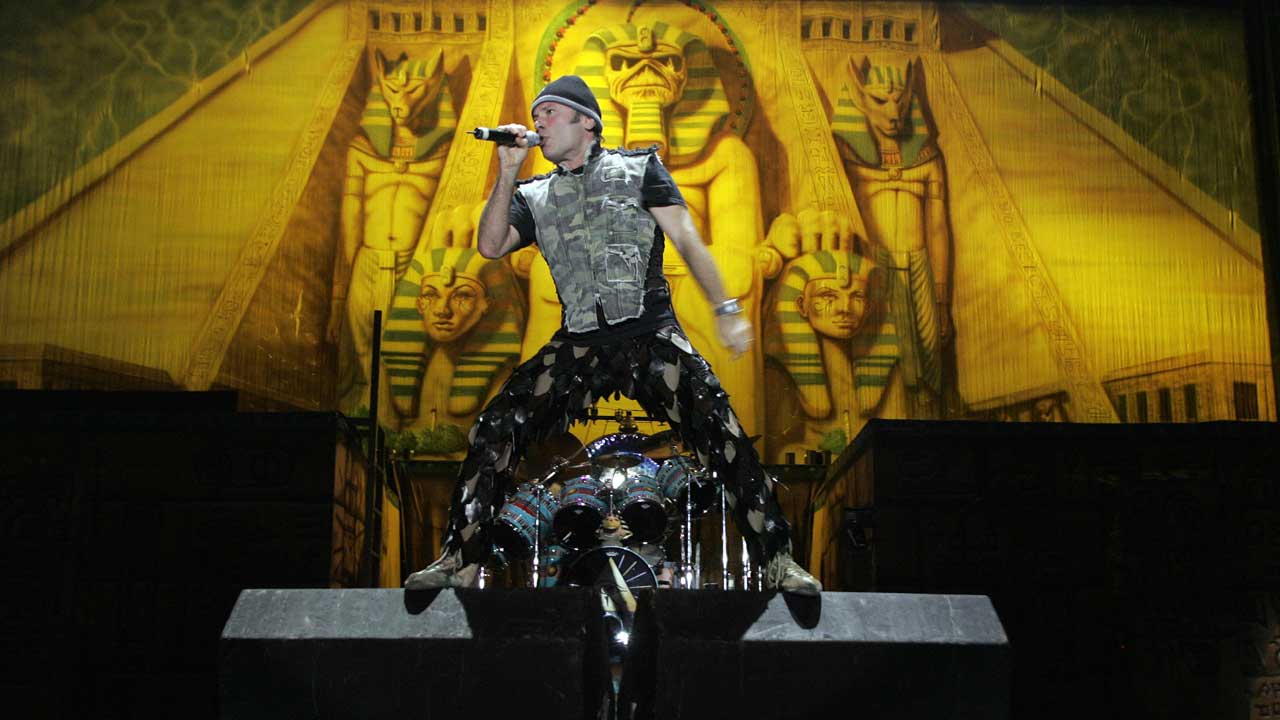
In 2009 Iron Maiden released Flight 666, a concert film showing the inner workings of the band's touring machine. But what made the six members tick? We spoke to them over a 12-month period, from the confines of Ed Force One, in late night bars, at the top of an Andean mountain range and in the midst of an Amazonian rainstorm.
For Iron Maiden fans, the Somewhere Back In Time world tour was the motherlode. The stage imagery and the songs were the same ones that have come to define heavy metal: Eddie in all his Egyptian Powerslave glory, Number Of The Beast, Piece Of Mind...
The list goes on: Spitfires, Winston Churchill’s ‘We shall never surrender!’ speech, fluttering Union Jacks, Rolls-Royce engines rumbling over the PA – it’s heavy metal’s finest pageantry on display. Not only was it the biggest tour a rock band had ever undertaken – 50,000 miles, 23 gigs, five continents and all in a heart-stopping 46 days – but the band had leased and converted an Airbus 757 into their very own “magic carpet” so that the logistics of touring on such an ambitious schedule could be achieved.
To top that, lead singer Bruce Dickinson could often be found piloting the plane on various different routes between gigs. Sing in a rock band? Easy! Sing on stage then fly the plane to Mumbai, you say? Even better...
A tour of this size took on a significance all of its own. Maiden’s manager Rod Smallwood took seriously an approach by two Canadian filmakers Sam Dunn and Scot McFadyen who had recently finished work on their acclaimed indie film A Headbanger’s Journey. Sam and Scot wanted to get under Maiden’s skin to not only provide the band with the ultimate live DVD of their performance, but go one further and find a way of explaining the world of Iron Maiden. The resulting ‘rockumentary’ captured hearts and minds at indie film festivals and on the international stage.
Yet for all the pomp and glory, the on-screen interviews with the band members never quite hit home in a way you might expect, only the ever verbose Dickinson really manages to articulate just what the band had achieved as they found themselves being adopted as national icons. So Classic Rock was determined to find out more about what made Maiden 2009 tick. Remember, this was a plane-wielding, stadium-filling, Brit Award-winning, film-making, box office-busting Iron Maiden: the biggest heavy metal band in the world.

Bruce Dickinson is the most complex personality in Maiden to unravel. Just what is he? Singer and frontman certainly, but there was a lot more going on in his life that defined him. For starters, he was a part-time pilot for Astraeus Airlines. When Maiden rested between tours, Bruce did not. Within a day of two of returning he’d again take to the skies as a pilot of a 757 for Astraeus.
It was Dickinson who conceived and orchestrated the mechanics of this tour – organising a team of engineers to refit and remodel the plane to take 12 tons of gear – backline, instruments, stage props, backdrops, monitors and one 12ft heavy metal mascot in its belly – a project he freely admits took over his life and almost drove him to exhaustion way before that very first show in Mumbai.
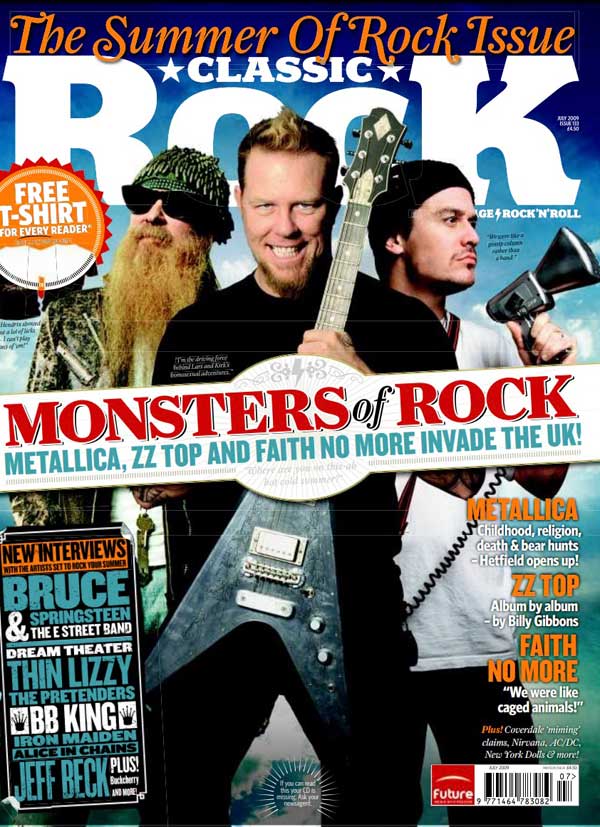
During off-months, Dickinson also released his debut feature film Chemical Wedding. He also had two more movie projects under development, and had rediscovered his appetite for fencing; he was challenging various national champs across South America, “giving away 30 years and a bucket of sweat”.
Two days after Classic Rock chatted to him, Bruce would also find time to fulfil a childhood dream of racing in an F1 Car round the Interlagos circuit, where Maiden played in front of 60,000+ rabid South Americans.
So did he feel healthier mentally knowing that Maiden is just one part of his life, instead of the defining part?
“Phew! Now that’s a big question…” he begins with a roll of the eyes. “I suppose the biggest stress that I get is trying to juggle things, because I have so many things that I do where other people depend on me. Obviously there is Maiden, but then there’s the flying aeroplanes thing, a spot of TV when it’s good… and my family of course.
“I want to do all of it because it’s all great fun, but you do have to balance it with responsibilities. Being in Maiden is a big privilege but it’s also a big responsibility. I have a responsibility when I go on stage to deliver a really good show and to be what people expect – and I do love it, but the stress comes with responsibility and sometimes you don’t feel like being responsible at all.”
The responsibility of being more than just a band is an issue that Maiden have faced on this run, as the sextet slowly come to terms with becoming (whisper it) a cultural phenomenon.
“I fucking hate that description,” groans Dickinson. “It’s like it’s game over and you don’t have to care anymore, because whatever you do will be cool or ‘signficant’, whatever that’s supposed to mean. We’re not U2 and we’re not here to save your soul. I recognise that we’ve touched lives and that that means something and I’m glad that it’s us that’s done that rather than say, Coldplay, but any responsibility does stop there. We are entertainers, and yes, I’d like us to be a band that you can believe in, but we’re nobody’s saviours.”
But you must feel proud of what you have achieved, after all you have eclipsed every goal you publicly set yourselves 10 years ago.
“Just the fact that the press, when there’s a minor incident in Colombia [referring to what the UK media dubbed the ‘Maiden riots’] now feel the urge to use footage from a year ago and try to fake something up… That means that we must be doing something right. It must matter what we’re doing. When the press decide that they’re actually going to write things about you that aren’t true because people want to hear it, I suppose that’s a measure of our success.
“Years ago, someone asked: ‘What’s the secret of Maiden’s success?’, and I said, ‘I wish it was complicated, but it’s just, Don’t let people down’. And always be able to say that you can count on Iron Maiden. So, always do your best, always be honest and don’t let people down. I can live with that on my headstone.”
Steve Harris, the granite-faced band leader, a driven, singularly determined soul whose life’s work is this heavy metal institution, has made Iron Maiden a band that you can believe in.
“I’d like to think that we’ve always been that from the beginning,” says Harris. “It’s the music, first and foremost, that gets people up and into us, but the fans really do believe in this band, sometimes obsessively, but that’s a positive thing.”
On the first leg of the tour in Costa Rica 08, this writer interviewed every member of Maiden and was surprised to hear each of them talk about the inevitability of the band’s end. Steve was typically robust about the next record being “Maiden’s last” and Bruce was clearly mapping out his future with a reduced Maiden role in it. But fast forward a year and they’re in no rush to get off their Mount Olympus. And for a couple of million people worldwide, it would certainly be a more horrible planet without Maiden in it.
“It would be a horrible thing for all of us, the band included, but you can’t go on forever,” laughs Steve. “I think that’s why we are enjoying it so much right now, ’cos we know it’s not too far away that we’re going to end up knocking it on the head, for whatever reason.”
You can’t really give up now, after playing gigs like these… “That’s exactly what we feel right now too. But if the demand wasn’t there as much, we’d still go around playing to people anyway. My ego doesn’t say that I’ve got play in front of 30,000 people or I quit.”
But would the Harris ego let the others still carry on as Iron Maiden should he wake up one morning and not feel able to meet his current standards?
“I don’t think it would ever come to that simply because I don’t think like that at all,” he scolds with a parent’s well-rehearsed toleration. “But if people wish to theorise like that, then I don’t see any reason why the band couldn’t carry on without me. I’m just one of six people. I know I’ve been a very important part and lot of people think that, but when a band gets to this level then, yes it could be done. I wouldn’t say that they wouldn’t miss me, because of the writing and everything else, but on stage, if they could find someone who’d give it some stick like I do, well, maybe… who knows?”
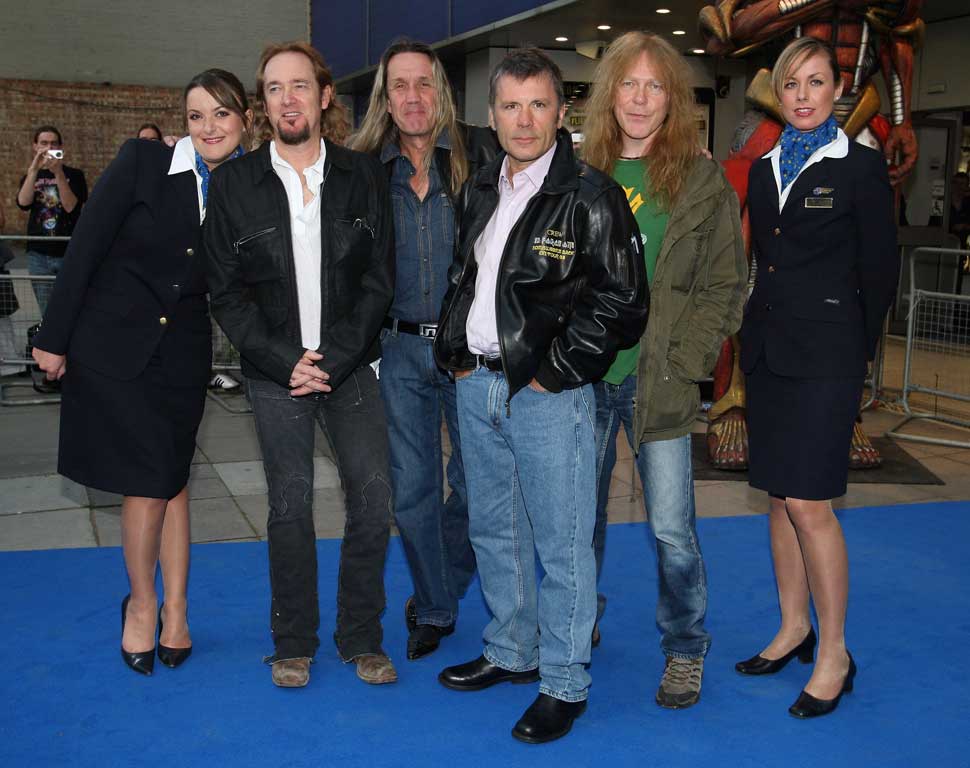
Classic Rock knows that this will never occur, as Steve confirms in the very next breath. “But as for me leaving, it’s just not going to happen.”
Nevertheless the next album could be the last… “I think there’ll be more, but it’s hard to say. We’re in so much demand for live shows, which is really nice, but we still want to do our studio stuff, so if there’s time and if everyone wants to do another one, then hopefully we will do another one. Everyone in the band does want to continue now, but three years down the line, who knows?”
Amid the hoopla of the film and the huge tour, one member of Maiden was less than enthusiastic about the prospect of a camera crew following him around. For livewire guitarist Janick Gers, the prospect of turning the familiar confines of Iron Maiden into a heavy metal Big Brother was a nightmare. University-educated Gers held back his fears about the trivialising of his passion in the wider interests of the band, albeit barely. Throughout the film Janick can be seen shoving a lens away from him and his main screen time comes on stage.
“It’s true that I wasn’t really very happy about this film being made,” he says twitching, eager to avoid the topic. “I don’t want to be a film star. Bands should have a bit of mystery about them. If you go in with cameras and see how everything works then a lot of what makes it special is better left unsaid. Once you demystify it, it’s not as interesting. So, yes, well observed Classic Rock, I wasn’t really up for it. I kept as much out of the way as I could.”
If you were looking for someone to tow the party line it wouldn’t be Gers you turned to first. He’s still the one most likely to leave the confines of a hotel besieged by fans either to hunt down an Irish bar, or, as Classic Rock finds him the next day, orchestrating a group of crew interested in an Amazon expedition to see the natural phenomena of the meeting of the waters, where the Rio Negro meets the Amazon in a stunning display of natural beauty.
Here, Janick is found moving from person to person explaining how the natural density of each river has led to the discolouration and sediment strata that can’t mix, thus giving rise to the violent black and tan separations. If he wasn’t a rock star, he would have been a geography teacher. An inspiring one at that.
“It’s so exciting!” he beams from the bow of the yacht, pointing at the separated waters. “I do love touring and going to different places – it’s all part of the thrill for me. But it’s also about you as a person going and seeing things and enjoying things. If I was just sitting in a hotel room all day, it wouldn’t be worth it, no matter how many people were out there in a crowd.
"That’s not what I want to do with my life. To go out and see new things – that’s exciting. That’s what touring’s about. Yes, the gig’s the most important thing, but you’ve got to suck up all this culture and architecture and discover how people live. You need to walk around the streets and understand their mentality, that’s how you grow.”
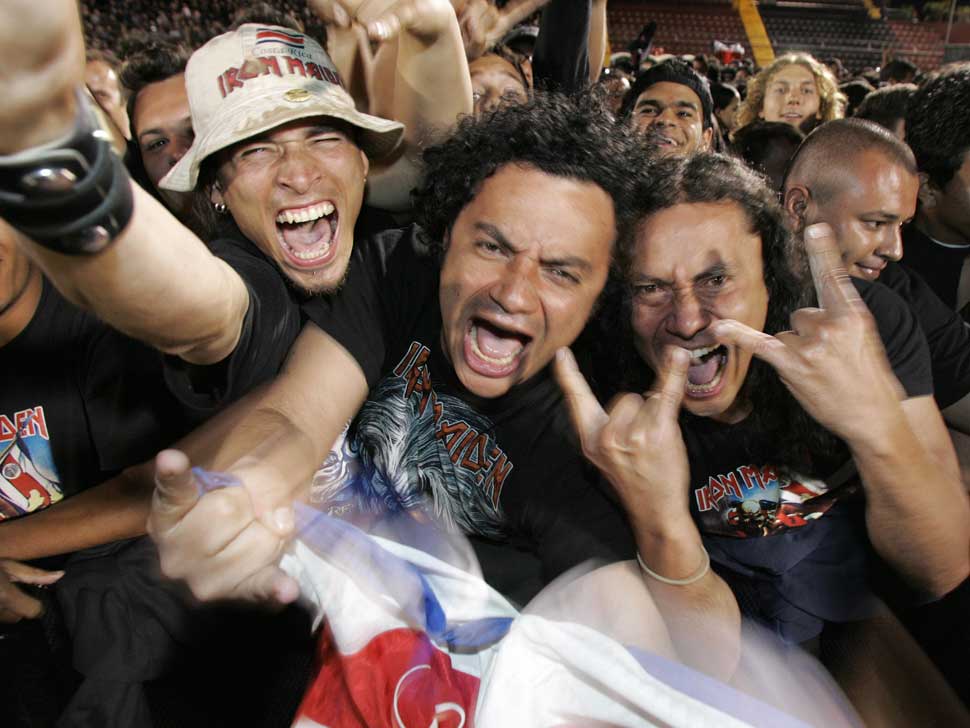
Adrian Smith has long been acknowledged as the resident ‘muso’ in Maiden, the guy most likely to lock himself away for weeks on end toiling endlessly at his chosen craft, when ironically, as Bruce comments in Flight 666, it’s the more spontaneous off-the-wall material that guitarist is actually valued for.
“I was surprised when I saw the film that I was featured quite a lot. That makes a change!” he quips, accepting the irony of the band’s noted recluse coming out of his privacy closet at the moment of their biggest impact.
Indeed, it’s Adrian who Classic Rock has waited a week to interview. He’s either off fishing with son Dylan or playing tennis with anyone who can give him a game. “Ironically, out of everybody I probably got on with the film crew really well. I thought their intentions were good. The stuff I’ve seen them do was from the heart and it was intelligent and I thought they’d do a good job, so I felt quite open to it.”
Classic Rock is surprised that Adrian Smith is prepared to entertain the idea of becoming far more of a prominent figure in the band at the expense of his valued privacy. “I’m no movie star,” he winces. “I’m a guitarist, I write songs, I play on stage, but obviously there’s a bigger picture that develops a life of its own. You just do what you do.
"But all that said, I do think it’s very important that people see that we’re a real band, because there’s so much bullshit in music now. Look at this current South American tour. There’s clearly a lot of poverty, and when you get poverty, music becomes a very important escape for people. Iron Maiden does have principles; we’ve always gone out and played to our fans wherever they are.”
If Steve Harris has ownership on the soul of Iron Maiden, then Nicko McBrain is its heart. His ebullience and gregarious sense of humour has him often cast as the band joker. Nicko’s contributions to Maiden are the intangibles, whether he’s orchestrating the next poker game or simply holding court, often he’s the one who makes the interminable waiting worthwhile.
Understandably for a drummer, it’s keeping up the energy of the live shows that’s been at the forefront of Nicko’s mind on this tour, as the band alternate between altitudes, timezones, hemispheres and seasons in a matter of days. In stark contrast to his joker image Nicko is very focused on keeping the show tight – and then sneaking in the partying wherever and whenever possible.
“One show isn’t different from any other in terms of what we put into it, but this passion down here in South America can’t be beaten. You don’t want to disappoint them so you feel you have to be a little bit more on edge. We don’t go on and play any better or worse. It’s Iron Maiden and you get what you get. But with the audience, they get so emotionally involved, the cheering and the chanting between songs and five minutes can go by where we don’t do anything other than the singalong with them.
“We do control the way we behave on stage. It’s noticeable. Last night [Quito, Ecuador], Steve and I were talking in the dressing room about how we were both feeling with the altitude… he had a dodgy tummy and wasn’t feeling 100 per cent. We have two expressions in the band when someone’s not feeling great: we say it’s either a laid-back Ronnie Scott’s gig tonight or a ‘tear-through-it-and-go’ Holiday Inn gig.
"Last night ’Arry wanted a ‘Ronnie Scott’s’ and I said, ‘You know that ain’t gonna happen, but we know we’ve both got to pace ourselves’. A little nudge to each other not to spend ourselves too early. But as soon as you get up there, that intro tape stops and off I go off on Aces High… whoops there goes the ‘Ronnie Scott’s’ gig!” he laughs.
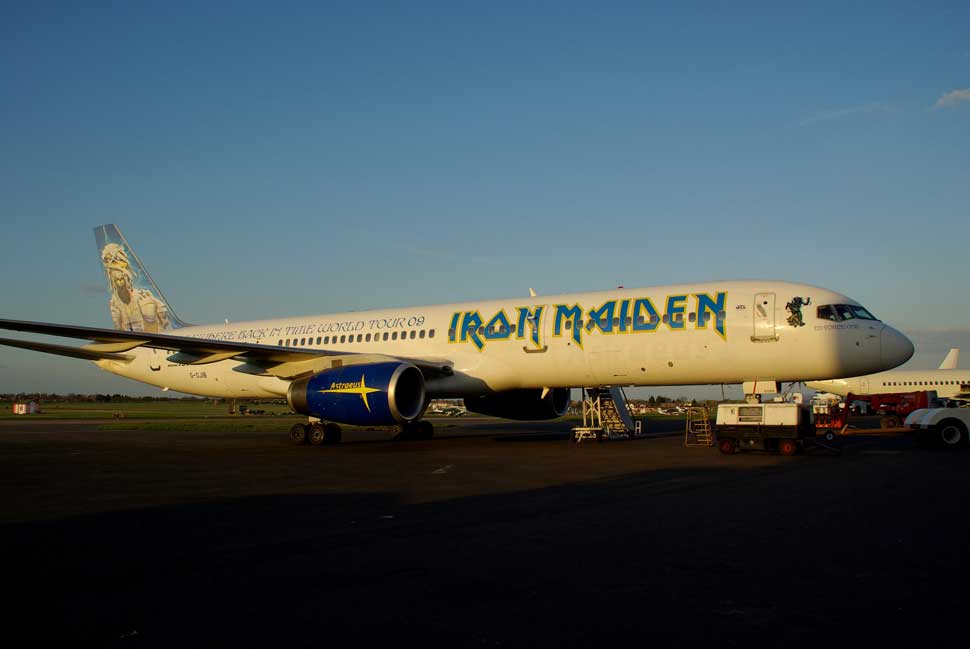
In stark contrast to Nicko, guitarist Dave Murray is often billed as ‘the quiet one’ in Iron Maiden. He’s also first to try to escape when interview time rolls round. In the film, Nicko comments that although Dave might not say a lot, when he does it’s usually worth listening to. Aside from Harris, Murray is the one other member of Iron Maiden who has been there since the very beginning. What Dave can tell you about their journey so far from the East End of London to the skies above South America is going to be worth a listen.
“A lot of fans who are coming to see this tour see all the lights and the set and everything that’s been put together on the outside, but they can never see what’s gone into it to get it there, not only the physical slog but also that human endeavour behind it. It’s the flipside of playing. The A-side is coming to see the show and the glamour. The other side… there’s a lot of hard work that goes into putting this on. So you get to see all that. It’s warts ’n’ all.”
Dave’s up and running about the Flight 666 film. And yes, everyone does think it’s a belter, a genuine sociological study of a band and their fans. But what does the man who’s been at this party 30 years really think of it?
“I think it really captured the spirit of what it means to be in Iron Maiden and also [to] be into Iron Maiden as a fan – and that certainly has not been done before. I do believe that music builds bridges and it knocks down walls in these countries where you’d never ever go to, even on holiday. To be able to go there and play music and bring together a group of people that have the same interest is very special. What we’ve been able to achieve, we’ll never take it for granted. We still get the goosebumps, going out to play. It feels like we’ve broken down some more barriers in some different countries.”
By that, you’re referring to that level of interaction between band and fans?
“Yes, but in fact I think that’s the core strength of Maiden, going right back to album number one. The course was kind of set all the way back then and we’ve just stuck to it. I don’t think it matters that there’s more people now, because we’ll just go in and do what we do anyway. And we’re not suddenly thinking that we’re under a microscope and the whole world’s watching just because we have all this attention. You block that out and focus on what you have to do. You can’t start changing your way of thinking because you’re successful.
“When Maiden started playing in the pubs in the late 70s I can tell you that countries with names such as Costa Rica, Colombia and Puerto Rico meant nothing more than specks on a map to me,” chuckles the softly-spoken guitarist. “To think that we’ve come all the way from a pub in the East End of London to playing a stadium with 55,000 people in it in Mexico is staggering.”
Ever tempted to do a high five with Steve?
“Nah. That’s not our style. But we did have a moment the other day looking at the plane on the tarmac at LAX Airport, with a sold-out LA Forum behind us, when I said to him, ‘It sure beats the crappy Fiat 500 we used to drive to take the gear down to the Horse & Cart in, doesn’t it?!’.”
This feature originally appeared in Classic Rock issue 133, published in July 2009.







